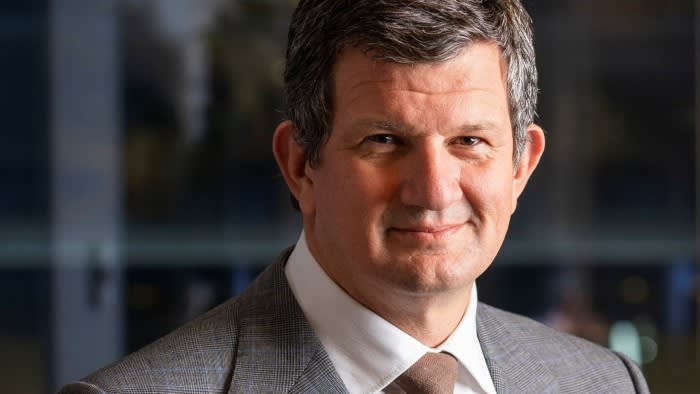Unlock the Editor’s Digest for free
Roula Khalaf, Editor of the FT, selects her favourite stories in this weekly newsletter.
Thomson Reuters has an $8bn war chest to spend on acquisitions and investments in artificial intelligence, according to chief executive Steve Hasker, as it bets that the technology will transform rather than undermine its business of supplying information to lawyers, accountants and other professionals.
Talking to the Financial Times before this week’s investor day, its first for three years, Hasker said the group had “tremendous financial firepower” to expand across AI-driven professional services and information as it plans to sell the rest of its holding in the London Stock Exchange Group.
“We have dry powder of around $8bn as a result of the cash-generative ability of our existing business, a very lightly levered balance sheet and the sell down of [our stake in] LSEG,” he said.
Thomson Reuters also plans to spend more than $100mn on developing its own AI technology every year to serve customers in sectors such as legal, tax and accounting.
Last year, the company completed a two-year programme designed to transform it from a content provider to a “content-driven” technology company. But Hasker said that, almost immediately after, “along came generative AI”, which he sees as again transformative for the group.
The way in which AI would change its customers’ spending patterns remained “very unclear”, he said, but it was one of several “tailwinds” propelling the group.
Acquisitions would mainly be focused on companies with AI capabilities, he said. Over the past 18 months it has spent about $2bn on buying companies such as SurePrep, Casetext and Pagero, a global e-invoicing and tax solutions business.
Hasker said that about four-fifths of the group’s revenues came from the US, but it wanted to “rebalance” that over the next three to five years so was looking “fairly aggressively” at further growth in areas from Brazil and Mexico to south-east Asia and Japan.
He added that the company had struck “a number” of deals with AI groups seeking to use Reuters news to train their large language models. He declined to comment, however, about the commercial terms, saying that “there appears to be a market price evolving”.
“These models need to be fed. And they may as well be fed by the highest-quality, independent fact-based content. We have done a number of those deals, and we’re exploring the potential there.”
Hasker also declined to comment on a pending copyright lawsuit from Thomson Reuters against Ross Intelligence, an AI-driven legal research company, which is seen as a test case for other media content owners.
Thomson Reuters now employs about 26,000 people worldwide. The Thomson family own just under 70 per cent of the group, with the rest listed in Toronto and New York. The company’s chair David Thomson — Canada’s richest man with a wealth of tens of billions of dollars — heads the media empire founded by his grandfather Roy Thomson.
“[The family] are long-term holders. They’re happy with the performance of the business, both in terms of the dividends and the accretion in the stock price over the last number of years, so don’t intend to do anything but continue to support us in the long term,” said Hasker.
Thomson Reuters acquired its holding in LSEG when the financial services group bought its former financial data business Refinitiv for $27bn in 2019. It sold a 4 per cent stake worth £1.9bn last month in LSEG, and shares worth almost $5.5bn last year.
Hasker said Thomson Reuters would exit the stake entirely next year. “This was a financial stake for us, not a strategic position. The last part of the lock-up is in the first quarter of next year. So you’d expect us to be out of that position sometime around then.”
Last year, it launched new AI services — which allow customers to ask complex research questions and receive AI-assisted answers from authoritative legal sources — and Hasker said that it planned a further six to eight product launches in the next few months alone, “which is an unprecedented rate of innovation”.
Reuters news is now one of the group’s smallest divisions, generating about a tenth of revenues in 2023. Analysts have asked whether it makes sense for the news bureau to be part of a group now positioning itself more as a technology company for professional services.
Hasker was clear, however: “Reuters is not for sale. Reuters is an integral part of our portfolio.”
He said that its Reuters news bureaus also had access to its AI tech, and could already use an AI tool that helped create ideas for stories. “I’ve been here for four-and-a-bit years and we have worked really hard to make these parts of the business work together. It’s early days but the evidence is growing that there’s some really interesting benefits to be shared.”
Hasker said the group had looked at whether to create a paywall for the news service — with rivals such as Bloomberg charging high subscriptions for access to their data and journalism — but he added for now it was focused on serving LSEG, its largest customer, and agency customers.
He added, however, that the group was looking at whether there were linked news and AI products for professionals that could exist behind a paywall.

Eugen Boglaru is an AI aficionado covering the fascinating and rapidly advancing field of Artificial Intelligence. From machine learning breakthroughs to ethical considerations, Eugen provides readers with a deep dive into the world of AI, demystifying complex concepts and exploring the transformative impact of intelligent technologies.


